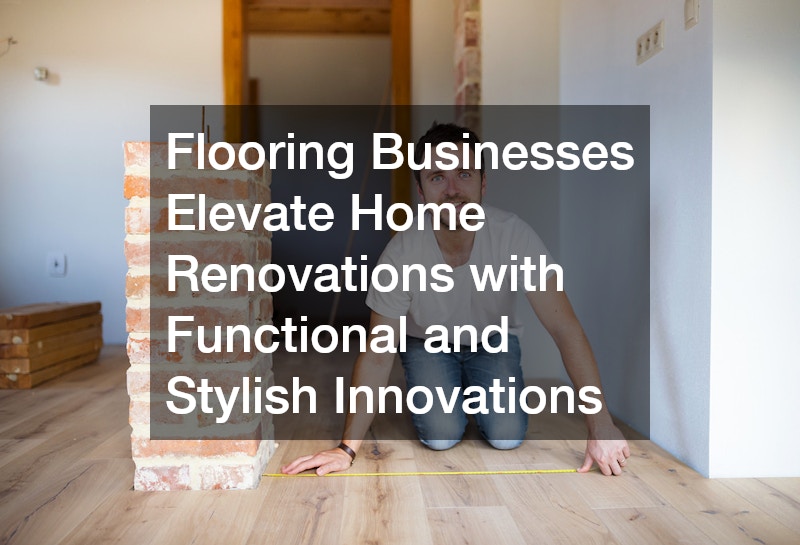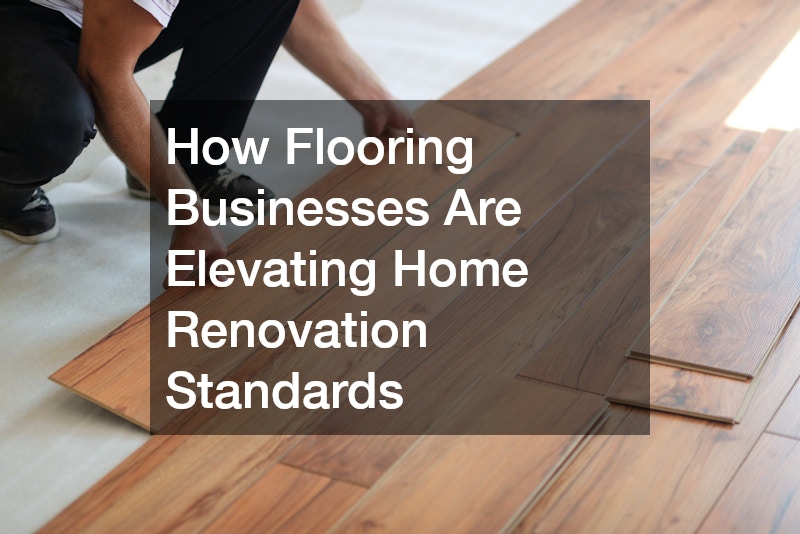Flooring businesses play a pivotal role in setting new benchmarks for home renovation, continuously pushing the boundaries in material innovation, installation techniques, and aesthetic appeal. As the foundation of any home renovation project, flooring can significantly influence not only the look and feel of a space but also its functionality and eco-friendliness.
What Innovative Flooring Materials are Trending in Home Renovations?
Eco-friendly and Sustainable Options
With rising concerns about environmental sustainability, materials like bamboo, cork, and recycled hardwood have gained popularity in home renovations. These materials not only provide an aesthetically pleasing finish but also offer renewable and biodegradable options, minimizing the environmental footprint.
Bamboo, for example, is a rapidly renewable resource that grows faster than traditional hardwoods, making it an ideal choice for eco-conscious homeowners. Cork flooring, on the other hand, offers thermal and acoustic insulation benefits while being harvested sustainably without harming trees.
Recycled hardwood uses previously utilized wood products, thereby reducing the demand for new resources and prolonging the life of materials that would otherwise become waste. Flooring businesses leverage these materials to attract eco-conscious consumers seeking both style and sustainability in their homes.
Technological Advancements in Flooring
Technological innovations have resulted in smart flooring solutions that interact seamlessly with advanced home systems. Examples include heated floors that enhance comfort in cold climates and sensor-enabled floors that enable intuitive control over lighting and temperature.
Moreover, developments such as antimicrobial surfaces and self-cleaning capabilities are revolutionizing how homeowners consider cleanliness and maintenance. These advancements not only add convenience but also improve health and safety, making innovative flooring solutions highly sought after in modern home renovations.
Through these technological strides, flooring businesses are able to offer solutions that go beyond the aesthetic, integrating functionality and innovation to meet the evolving demands of homeowners. This attraction to technologically advanced flooring options continues to drive the industry forward.
How Do Flooring Businesses Ensure Quality and Durability?
Industry Standards and Certifications
To ensure the highest quality and durability of flooring products, businesses adhere to key industry standards and certifications which serve as benchmarks for performance. Certifications like the FSC (Forest Stewardship Council) and FloorScore are crucial in verifying the sustainability and low-VOC emissions of flooring materials.
These certifications not only provide assurance to consumers about the product’s environmental impact but also affirm their health and safety by ensuring the use of low-emission materials. Flooring businesses rely on these credentials to build trust with consumers, emphasizing their commitment to quality and environmental responsibility.
By meeting industry standards, flooring businesses can guarantee product longevity, thereby enhancing consumer satisfaction and promoting loyalty. Such commitment to standards has established the industry as one of reliability and integrity.
Installation Techniques for Longevity
Advanced installation techniques are instrumental in achieving the longevity and durability of flooring, directly impacting the product’s performance and life span. Methods such as floating installation or glue-down techniques cater to different types of flooring, influencing their resilience and maintenance requirements.
Floating installations, applicable to laminate and engineered wood, allow the floor to expand and contract in response to humidity, thereby reducing damage and enhancing longevity. Glue-down installations, meanwhile, provide a stable base for luxury vinyl tiles, ensuring cohesion and reducing wear and tear.
These techniques not only ensure a high-quality finish that lasts but also provide consumers with confidence in their flooring investment. Flooring businesses prioritize these installation methods to meet the high standards that consumers expect, ensuring both quality assurance and customer satisfaction.
What Are the Latest Trends in Customization and Aesthetic Appeal?
Customization and Personalization Services
Today’s homeowners are increasingly turning towards customized flooring options that reflect personal style and accommodate unique space requirements. Flooring businesses are responding with diverse personalization services, offering varied textures, patterns, and colors to match any interior design vision.
Customers can choose from custom stains, finishes, and even branded designs, ensuring that each flooring installation is as unique as the individuals it caters to. Through digital visualization tools, flooring businesses enable clients to see exact iterations of customized designs before making final decisions.
This approach to personalization not only enhances customer satisfaction but also showcases the ingenuity and adaptability of flooring businesses in an ever-evolving marketplace. Personalization helps cater to both aesthetic choices and personal preferences, creating spaces that are distinctively bespoke.
Modern Aesthetic Trends
Modern flooring aesthetics are heavily influenced by global design trends, with popular choices ranging from minimalistic, monochromatic tones to vibrant, statement-making patterns. Natural textures and rustic finishes are being seamlessly integrated with contemporary styles, resulting in a unique fusion that appeals to diverse tastes.
Additionally, the trend of seamless indoor-to-outdoor transitions has led to the increased use of materials that blend effortlessly with surrounding environments, such as stone-look tiles and textured woods. The flexibility and variety available in flooring options allow homeowners to experiment and create spaces that reflect current design tendencies.
Flooring businesses remain on the cutting edge by continually incorporating new design trends and offering extensive choices to consumers. By doing so, they not only enhance the aesthetic appeal of living spaces but also position themselves as leaders in the home renovation industry.
Flooring businesses are at the forefront of enhancing home renovation standards by offering innovative solutions that cater to both functionality and aesthetics. The integration of sustainable materials, technological advancements, and personalized designs positions them as key players in modern home design.
Through adherence to industry standards and the implementation of advanced installation techniques, flooring businesses ensure quality and durability, fostering customer trust and satisfaction. As they continue to push the boundaries of design and functionality, the impact of their contributions to home renovations continues to evolve, setting new benchmarks for the industry.

